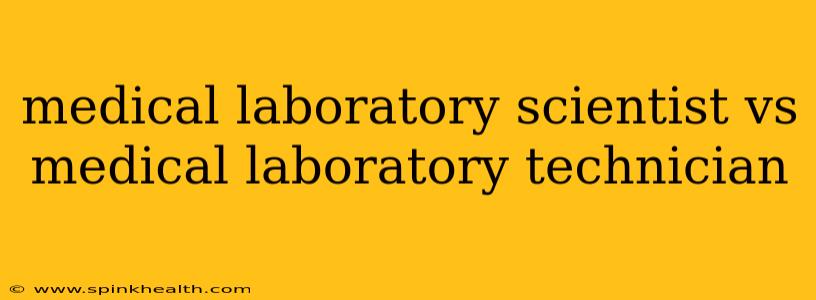Medical Laboratory Scientist vs. Medical Laboratory Technician: Unraveling the Differences
The world of medical laboratory science is fascinating, filled with intricate tests and analyses that are crucial for diagnosing and treating diseases. But within this field lie distinct roles, often causing confusion: the Medical Laboratory Scientist (MLS) and the Medical Laboratory Technician (MLT). This isn't just a matter of title; the responsibilities, education, and career paths differ significantly. Let's delve into the specifics, tracing the journeys of two individuals embarking on these rewarding careers.
Imagine Sarah, a bright and meticulous individual with a passion for uncovering the microscopic mysteries of the human body. She dreams of becoming a Medical Laboratory Scientist. Meanwhile, her friend, Mark, equally driven and precise, envisions himself as a Medical Laboratory Technician, contributing his expertise to the crucial diagnostic process. Their paths, while intertwined, diverge in several key ways.
What is a Medical Laboratory Scientist (MLS)?
Sarah, our aspiring MLS, understands that her path requires a deeper dive into the scientific principles underlying laboratory work. She'll need a bachelor's degree in medical laboratory science or a closely related field, often including extensive hands-on training in various laboratory techniques. This rigorous education equips her with the advanced knowledge necessary to:
- Perform complex tests: Sarah will be proficient in analyzing a wide range of specimens, from blood and urine to tissue samples, employing sophisticated techniques like molecular diagnostics, immunology, and microbiology. She'll be interpreting the results of these tests independently, understanding the nuances and implications for patient care.
- Develop and implement new methods: Her advanced education allows Sarah to contribute to the improvement of laboratory processes, potentially developing and implementing new testing methodologies, ensuring the lab remains at the cutting edge of diagnostic technology.
- Lead and supervise teams: In many settings, MLSs take on leadership roles, overseeing the work of MLTs and other laboratory personnel, ensuring the smooth and efficient operation of the lab.
- Conduct research: Some MLSs pursue research roles, contributing to the advancement of medical laboratory science through studies and publications.
What is a Medical Laboratory Technician (MLT)?
Mark, aiming to become an MLT, embarks on a slightly different journey. His training involves an associate's degree or a certificate program focusing on practical laboratory skills. While his expertise is highly valued, his role typically involves:
- Performing routine tests: Mark will be highly skilled in conducting common laboratory tests under the guidance of an MLS or other qualified personnel. This includes tasks like preparing samples, operating equipment, and performing basic analyses.
- Following established protocols: While capable and precise, Mark's role primarily focuses on adhering to established procedures, ensuring accuracy and consistency in test results.
- Assisting MLSs: Mark provides invaluable support to MLSs, assisting with complex tests, maintaining equipment, and ensuring the lab runs smoothly.
What are the Educational Requirements for each role?
H2: What educational requirements are necessary to become a Medical Laboratory Scientist?
Becoming a Medical Laboratory Scientist requires a bachelor's degree in medical laboratory science (MLS) or a closely related field from an accredited program. These programs typically include extensive coursework in biology, chemistry, and other relevant sciences, as well as significant hands-on laboratory experience. Graduation is often followed by certification examinations for professional licensure.
H2: What educational requirements are necessary to become a Medical Laboratory Technician?
To become a Medical Laboratory Technician, one typically needs an associate's degree or a certificate from an accredited program. These programs focus on providing practical laboratory skills, including training on common laboratory equipment and procedures. While the educational path is shorter, the practical training is equally crucial for accuracy and efficiency in this role.
What are the Job Responsibilities and Duties of each role?
H2: What are the job responsibilities and duties of a Medical Laboratory Scientist?
MLS responsibilities extend beyond performing tests. They include interpreting complex test results, developing and implementing new methodologies, overseeing the work of other lab personnel, and potentially conducting research. They are often responsible for quality control and ensuring compliance with regulations.
H2: What are the job responsibilities and duties of a Medical Laboratory Technician?
MLTs focus on performing routine laboratory tests, maintaining equipment, and preparing samples. Their work is essential for the smooth operation of the lab, and their accuracy contributes significantly to accurate patient diagnoses. They work under the supervision of an MLS or other qualified personnel.
Career Advancement and Salary Expectations:
Both MLSs and MLTs enjoy strong career prospects, but the potential for advancement and salary often differs. MLSs often have greater opportunities for supervisory roles, research positions, and higher earning potential due to their advanced education and expertise.
In Conclusion:
Sarah and Mark, with their diverse skill sets and educational paths, represent the crucial collaboration within medical laboratories. While both contribute significantly to patient care, the MLS role requires a deeper understanding of scientific principles and more advanced responsibilities, while the MLT's contribution is vital for accurate and efficient laboratory function. The choice between these paths depends on individual aspirations, educational preferences, and career goals. Both careers, however, offer fulfilling opportunities to contribute to healthcare and make a real difference in people's lives.

